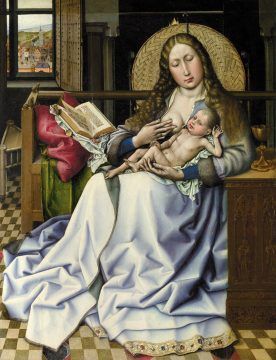Elizabeth Bruenig at the NYRB:

Thus the inviolable and pure Mary sees her reflection in an inviolable and pure Church—theoretically. It’s perhaps no surprise that Catholics (and here I should say that I am one) are especially protective of Mary’s virtue in a period of shattering sexual scandal. We are moderns; our faith is fragile, beset on all sides by relentless demystification, skepticism, and the accumulation of shame for the Church’s wrongdoings. Mockery and vulgar insults are as effective as any of these, because they arrive as messengers of modernity, sending up superstitions of the past: Could such a person as Mary have really existed, and what sort of fool would think so? When we protect her from disparagement or doubt, we also protect ourselves.
Medieval Christians (at least those of East Anglia during the late Middle Ages) felt less compunction on this front, argues Emma Maggie Solberg in her provocatively titled Virgin Whore, which explores a time, place, and literary tradition in which slights to Mary’s modesty arrived not as risks to the faith but as part of popular piety.
more here.
